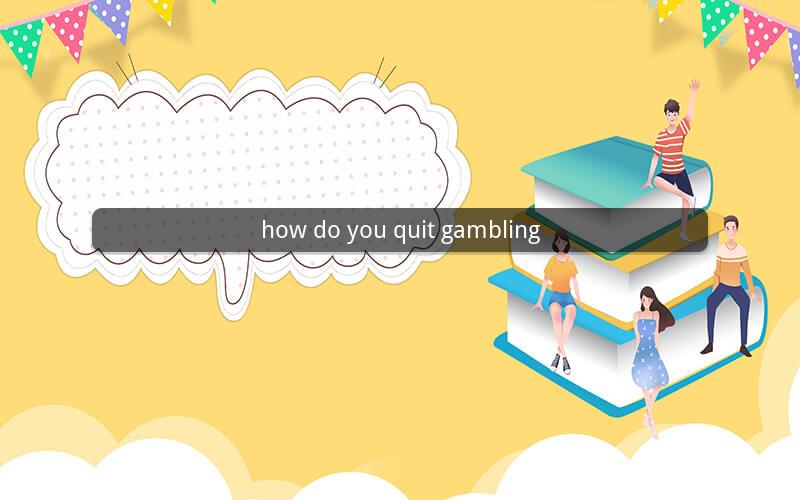
Quitting Gambling: A Comprehensive Guide
Table of Contents
1. Understanding the Problem
2. The Importance of Quitting
3. Identifying Triggers
4. Building a Support System
5. Strategies for Quitting
- Detoxification
- Cognitive Behavioral Therapy
- Relapse Prevention
6. Alternative Activities
7. Financial Recovery
8. Emotional Support
9. Legal and Ethical Considerations
10. Long-Term Success
1. Understanding the Problem
Gambling addiction is a serious issue that affects millions of people worldwide. It is characterized by an inability to control gambling behavior, leading to significant financial, social, and emotional consequences. Recognizing the signs of gambling addiction is the first step towards quitting.
2. The Importance of Quitting
Quitting gambling is crucial for several reasons. It can help individuals regain control over their lives, restore financial stability, improve relationships, and reduce the risk of legal and health problems associated with gambling addiction.
3. Identifying Triggers
Identifying triggers is essential for developing a plan to quit gambling. Triggers can be emotional, environmental, or related to social situations. Common triggers include financial stress, boredom, or socializing with gamblers.
4. Building a Support System
A strong support system can significantly increase the chances of successfully quitting gambling. This may include friends, family, support groups, or professional therapists. Sharing experiences and receiving encouragement from others who have overcome gambling addiction can be incredibly helpful.
5. Strategies for Quitting
5.1 Detoxification
Detoxification is the process of removing the substance (in this case, gambling) from one's life. It can be a challenging process, but it is essential for breaking the cycle of addiction. This may involve removing access to gambling websites, avoiding gambling venues, and limiting contact with other gamblers.
5.2 Cognitive Behavioral Therapy (CBT)
CBT is a type of therapy that helps individuals identify and change negative thought patterns and behaviors. For those struggling with gambling addiction, CBT can help develop healthier coping mechanisms and reduce the urge to gamble.
5.3 Relapse Prevention
Relapse is a common challenge for those trying to quit gambling. Developing a relapse prevention plan can help identify potential triggers and strategies to avoid them. This plan should include a list of coping skills and a support network to turn to when cravings arise.
6. Alternative Activities
Finding alternative activities to fill the void left by gambling can be a significant step towards recovery. Engaging in hobbies, exercising, and socializing with non-gambling friends can help distract from the urge to gamble.
7. Financial Recovery
Gambling addiction often leads to financial difficulties. Addressing these issues is essential for long-term recovery. This may involve creating a budget, seeking financial counseling, and developing a plan to pay off debts.
8. Emotional Support
Emotional support is vital for those struggling with gambling addiction. Therapy, support groups, and counseling can provide a safe space to express feelings and develop strategies for dealing with the emotional aspects of addiction.
9. Legal and Ethical Considerations
Gambling addiction can have legal and ethical implications. It is important to be aware of these issues and seek help to address any potential consequences. This may involve consulting with legal professionals or seeking assistance from organizations that specialize in gambling addiction.
10. Long-Term Success
Long-term success in quitting gambling requires commitment and ongoing effort. It is essential to maintain a support system, continue therapy or counseling, and stay vigilant for potential triggers. Celebrating milestones and acknowledging progress can also help maintain motivation and determination.
---
Questions and Answers
1. Q: What are the first steps in quitting gambling?
A: The first steps include recognizing the problem, seeking support, and identifying triggers.
2. Q: Can I quit gambling on my own?
A: While it is possible to quit on your own, seeking support from friends, family, or professionals can significantly increase your chances of success.
3. Q: How long does it take to recover from gambling addiction?
A: Recovery time varies from person to person. Some may experience immediate relief, while others may need ongoing support for years.
4. Q: Are there medications that can help with gambling addiction?
A: There are no medications specifically designed for gambling addiction, but some may help manage underlying mental health issues.
5. Q: What can I do if I relapse?
A: If you relapse, it is important to acknowledge it, learn from the experience, and seek support. Refocusing on your recovery plan can help you get back on track.
6. Q: Can I still enjoy gambling in moderation?
A: For those with gambling addiction, it is generally recommended to avoid gambling altogether to prevent relapse.
7. Q: How can I support a loved one who is struggling with gambling addiction?
A: You can offer support by listening, encouraging them to seek help, and being patient and understanding.
8. Q: Are there online resources available for gambling addiction?
A: Yes, there are numerous online resources, support groups, and counseling services available for those struggling with gambling addiction.
9. Q: Can gambling addiction affect my career?
A: Yes, gambling addiction can significantly impact your career, including job performance, financial stability, and work relationships.
10. Q: Is it possible to overcome gambling addiction?
A: Yes, it is possible to overcome gambling addiction with the right support, resources, and commitment to recovery.